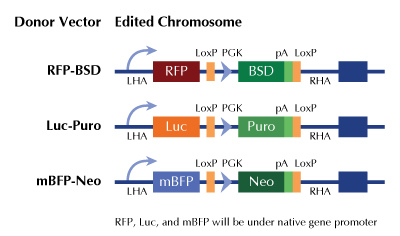ROR1 Human Gene Knockout Kit (CRISPR)
CAT#: KN214967BN
ROR1 - human gene knockout kit via CRISPR, HDR mediated
Functional Cassette: GFP-puro Luciferase-Puro RFP-BSD
HDR-mediated knockout kit validation
USD 1,657.00
4 Weeks*
USD 450.00
USD 1,287.00
Specifications
| Product Data | |
| Format | 2 gRNA vectors, 1 mBFP-Neo donor, 1 scramble control |
| Donor DNA | mBFP-Neo |
| Symbol | ROR1 |
| Locus ID | 4919 |
| Components |
KN214967G1, ROR1 gRNA vector 1 in pCas-Guide CRISPR vector, Target Sequence: GCTGCTGCTGGCCGCACGCG KN214967G2, ROR1 gRNA vector 2 in pCas-Guide CRISPR vector, Target Sequence: ATGCACCGGCCGCGCCGCCG KN214967BND, donor DNA containing left and right homologous arms and mBFP-Neo functional cassette. GE100003, scramble sequence in pCas-Guide vector |
| Disclaimer | These products are manufactured and supplied by OriGene under license from ERS. The kit is designed based on the best knowledge of CRISPR technology. The system has been functionally validated for knocking-in the cassette downstream the native promoter. The efficiency of the knock-out varies due to the nature of the biology and the complexity of the experimental process. |
| Reference Data | |
| RefSeq | NM_001083592, NM_005012 |
| UniProt ID | Q01973 |
| Synonyms | dJ537F10.1; NTRKR1 |
| Summary | This gene encodes a receptor tyrosine kinase-like orphan receptor that modulates neurite growth in the central nervous system. The encoded protein is a glycosylated type I membrane protein that belongs to the ROR subfamily of cell surface receptors. It is a pseudokinase that lacks catalytic activity and may interact with the non-canonical Wnt signalling pathway. This gene is highly expressed during early embryonic development but expressed at very low levels in adult tissues. Increased expression of this gene is associated with B-cell chronic lymphocytic leukaemia. Alternative splicing results in multiple transcript variants encoding different isoforms. [provided by RefSeq, Jun 2012] |
Documents
| Product Manuals |
| FAQs |
| SDS |
Resources
Other Versions
| SKU | Description | Size | Price |
|---|---|---|---|
| KN214967 | ROR1 - human gene knockout kit via CRISPR, HDR mediated |
USD 1,657.00 |
|
| KN214967LP | ROR1 - human gene knockout kit via CRISPR, HDR mediated |
USD 1,657.00 |
|
| KN214967RB | ROR1 - human gene knockout kit via CRISPR, HDR mediated |
USD 1,657.00 |
|
| KN414967 | ROR1 - KN2.0, Human gene knockout kit via CRISPR, non-homology mediated. |
USD 1,657.00 |
|
| GA103285 | ROR1 CRISPRa kit - CRISPR gene activation of human receptor tyrosine kinase like orphan receptor 1 |
USD 1,657.00 |
{0} Product Review(s)
Be the first one to submit a review






























































































































































































































































 Germany
Germany
 Japan
Japan
 United Kingdom
United Kingdom
 China
China
